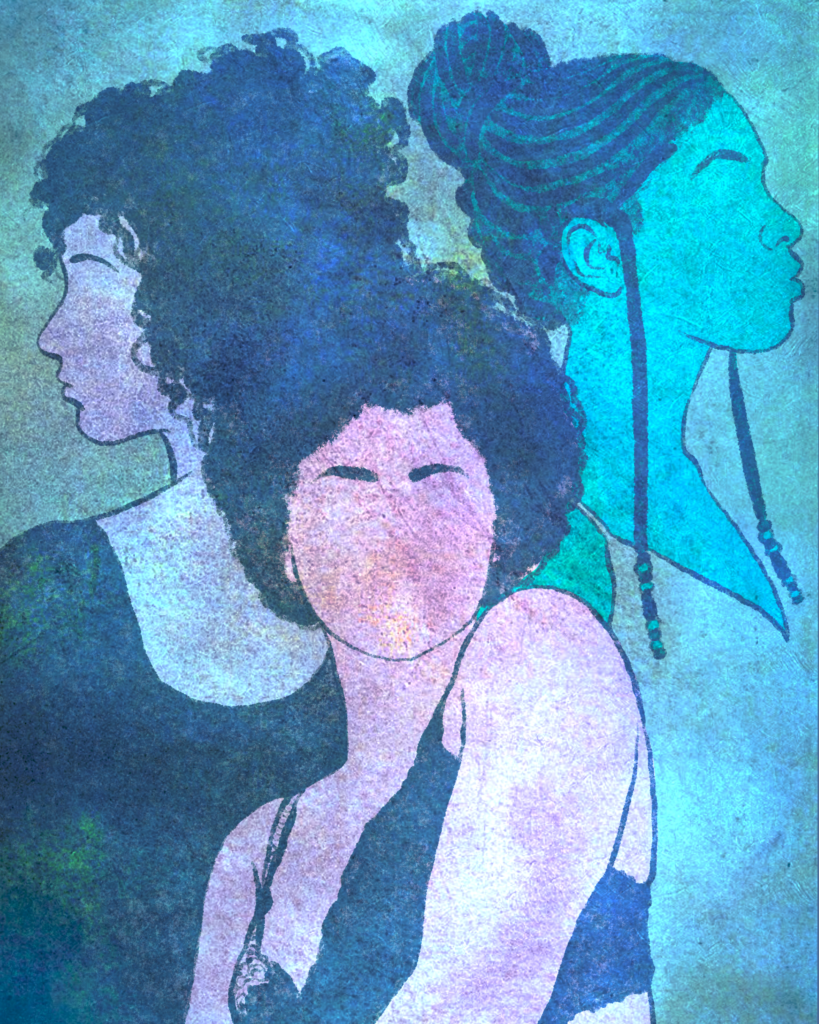Illustration by team illustrator Sakura Siegel.
After years of searching for a curly hair specialist, Kylie Nieves still hasn’t found a go-to stylist.
The Hudson County resident told Slice of Culture that when looking at rates for haircuts, there is a huge difference between a straight haircut versus a curly cut.
“I understand it’s work, but you’re looking at around $50 for a straight hair cut versus $300 curly cuts! I gave up. And I see a hairstylist who tries to blow out my hair every chance she gets, throws random products in my hair and scrunches while I’m right side up, and doesn’t even know how to use a diffuser. I’ll end that by saying the more textured your hair is, the harder it is to find someone knowledgeable to cut it (especially at an affordable price),” Nieves said.
For many years, people with textured hair, (3A to 4C) have been told from schools and a variety of salons that their hair is unmanageable. Although things have improved, even in 2023, people still have trouble finding proper care for their hair and their haircuts.

The “Crown Act” making race-based discrimination on hair illegal, first passed in July 2019 in California. The bill was later passed in New Jersey in December 2019, a campaign headed by then-state Senator Sandra B. Cunningham and then-Assemblywoman Angela McKnight. Since this signing, 23 states, including NYC, have passed the bill as well.
But in October 2023, an incident in South Jersey made headlines in the hair community.
In Gloucester County, a state investigation came to the conclusion that Gloucester Institute of Technology did not have enough Black training mannequins. Non-Black students were also not required to take classes on how to cut and style Black and textured hair. The State Attorney General Matthew Platkin announced that all New Jersey cosmetology schools were now required to teach their students equally in the styling of Black and other forms of textured hair.
“It is very necessary. Hair is not just hair. They have to know all different types of hair,” Amy Layton, coordinator of the Beauty Professions Program at Raritan Valley Community College stated.
His office said that the Gloucester County Institute of Technology and the state Division of Civil Rights have agreed that the institute will “instruct all students in the theory and practice of styling all hair types and textures, regardless of the race/ethnicity of the student.”
Jennica Santos, owner of L’amour de Soi Beauty and stylist at Skye Stylez Studio in Bayonne, graduated from Parisian Beauty Academy in Hackensack in December 2022.
“I have worked on different types of hair throughout my career from straight, wavy, to curly hair. I have never worked on coily hair, but I wish I had more experience. I mainly work on straight hair,” she said.
“We learned about textured hair at school, but it wasn’t as in depth as I hoped it would be. We didn’t work on textured hair as much as the other hair types. We only had one mannequin with coily hair where we practiced blowouts and relaxers on.”
Each cosmetology school has different curriculums. In New Jersey, at least 20% of the mannequins used for student training will have black hair.
Santos described that at her school there were very few courses provided on textured and coiled hair. “Pin Curls” and “Permanent Wave Assessment” were the classes that stuck out most, but most did not state any courses on “Curly” or “Textured” hair.
When discussing about the about the new bill passed after the October incident, she said:
“I feel like they should have passed this law a long time ago. I wish I had the opportunity to learn more about textured hair while I was in school so I wouldn’t have to seek classes now.”
In NYC, they passed Bill S6528A in November and its main goal to diversify cosmetology school education in order to educate all students—regardless of race—about every hair texture.
The bill explains that graduates should be able to provide hair care services “to individuals with all hair types and textures, including, but not limited to, various curl or wave patterns, hair strand thicknesses, and volumes of hair.” It was signed into law on November 17, but will go into full effect in approximately six months.
Nelia Rodriguez, owner of CrownNCurls LLC and Freelance Artist working out of Takamichi Hair, explained her experience as a NYC cosmetologist.
“Kicking off my journey as a licensed cosmetologist, I’ve had the pleasure of delving into a rich spectrum of hair textures. I’ve crafted styles ranging from silky straight to beautifully curly and coiled hair. Yet, where I truly find my artistic flair ignited is in the intricate world of wavy, curly, and coily hair, where I get to create unique, stunning looks that celebrate natural beauty,” Rodriguez said.
With many salons not providing classes on textured and natural hair, Rodriguez found ways to learn the techniques.

“… While the curriculum didn’t prioritize cutting and styling natural hair, I sought out additional courses after graduating to delve deeper into this specialized area. My journey led me to one of NYC’s premier curly hair salons, where I refined my skills and expertise in working with textured hair. It’s there that I truly honed my craft and passion for creating stunning styles that celebrate natural beauty.”
“It’s quite common for salons to lack courses focusing on textured hair simply because they might not cater to that specific hair type or demographic,” she added. “The salon’s focus and the local clientele play a significant role. Mastering the art of working with curls isn’t just a skill; it’s a specialized craft that demands a profound understanding of different curl patterns and techniques.”
Mary Alduey, who graduated from New Horizon cosmetology school from 1991-1992 and taught in Robert Finance, Christine Valmy, and New Concept beauty school, also shared that demographics near schools may play a huge role when it comes to textured hair.
“I believe working with specific hair is a choice. Certain salons may not provide classes to their stylists on some textures due to the demographics around you,” Alduey said.
Alduey was also unaware of the new bills passed in NJ and NYC.
“People tend to practice what they feel most comfortable with or what they like, if you have textured hair, you’ll end up doing textured hair,” she added. “People with textured hair usually wind up with a stylist that has textured hair. People seem to perceive it this way.”
For Rodriguez, she said she’s “thrilled” about the new laws and explained that this “will undoubtedly foster greater diversity within salons, empowering stylists to develop new skills and specialties. Most importantly, it will create an inclusive environment where clients feel not just welcomed but truly embraced, regardless of their hair texture, ensuring comfort and confidence wherever they go.”
Santos agreed and said it will set up for a better future.
“I believe expanding knowledge on all hair types will benefit cosmetology schools and future customers with textured hair. Cosmetology students will not feel intimidated by textured hair due to lack of knowledge and experience. If they can successfully do textured hair, they will be able to do any type of hair. Future clients with textured hair will feel more welcomed, comfortable and confident in more salons.”












